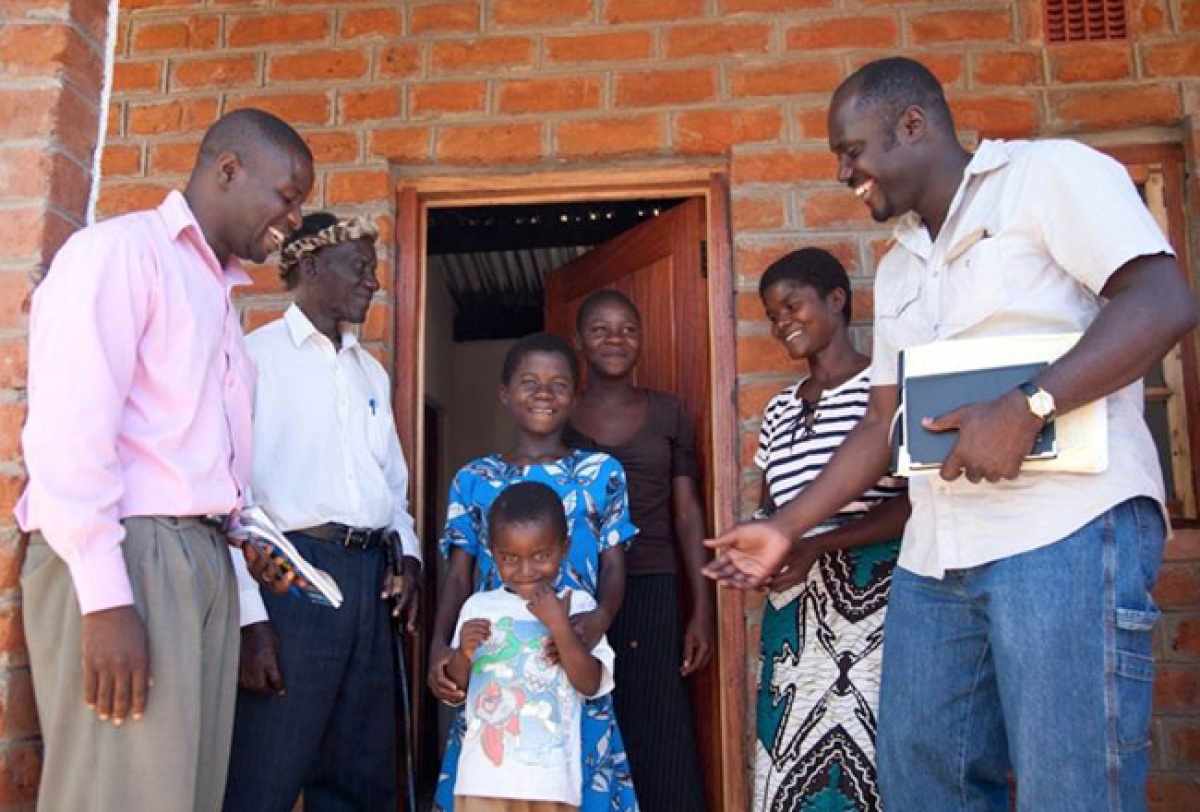Malawi: Improving Health through Social Support
Posted on Feb 19, 2014

Malita Gondwe* needed shelter. The single mother of two had been living behind a few crumbling brick walls in the remote Nelesani Village of Neno District, Malawi. There was no floor, only dirt and rock covered with straw. There was no roof, again only straw, which Gondwe bundled together and wedged into the corner.
Gondwe, who receives health care at the PIH-supported Lisungwi Community Hospital, is HIV-positive. For someone with a compromised immune system, a sturdy, dry, well-ventilated shelter could be the difference between life and death. In 2012, Gondwe met with representatives from the Program on Social and Economic Rights (POSER), a project managed by PIH’s Malawian sister organization Abwenzi Pa Za Umoyo (APZU). After a detailed review and consultations with other village members, the POSER team decided that renovating the dilapidated structure wasn’t an option. Gondwe needed a new home.
POSER bolsters PIH/APZU’s clinical efforts by providing social and economic accompaniment to families and individuals in the greatest need. To ensure our efforts are integrated with broader development goals, POSER, like all of APZU’s departments, works closely with various government ministries. We’ve partnered with the Ministry of Education, Science, and Technology to equip students with necessary school supplies. The District Office of Social Welfare has helped POSER staff run an economic-empowerment program for women that gives participants paid, real-world experience managing a set of small restaurants.
If we treat a patient for pneumonia and he goes home to a damp hut with a leaky roof, he’s going to get sick again.
POSER staff also addresses substandard housing, a critical issue in Neno. “Poorly constructed houses, poorly ventilated houses can raise the risk for pneumonia. Other houses in poor shape can be a breeding ground for malaria because there are so many mosquitos. If we treat a patient for pneumonia and he goes home to a damp hut with a leaky roof, he’s going to get sick again,” POSER Program Manager Victor Kanyema says. Another trip to the hospital means additional strain on the health system and missed days of school or work or both for patients and their families. “But if we are creating a good environment for the patient to live in, then we contribute positively to the health of a particular individual and the community,” Kanyema says. (Read more about Kanyema and his work.)
POSER identifies families and individuals to accompany through two main channels. Families can request POSER assistance directly, and clinicians can refer patients to POSER. Poverty is pervasive in Neno, and it can be difficult to specify a family’s greatest needs. That’s why after the initial connection is made, a small team from POSER makes a home visit and conducts an in-depth survey, involving extensive patient input on their needs. This field-based fact-finding allows staff to gather qualitative evidence and tailor the assistance.

Malita Gondwe at the home she lived in before teaming up with POSER staff.
Due to the high level of poverty and limited resources in Neno, upwards of 30 percent of the people who are visited qualify for housing support. While POSER may not have the capacity to help everyone in need, its achievements are impressive. To date, more than 70 houses have been built through POSER, and another 120 homes have been renovated.
Renovating a home or providing a new one can alleviate stress for the inhabitants, making it easier for people to focus on new pursuits. “We were living in fear of the house collapsing when the rains come,” said Mphatso Malichi, a 62-year-old who lives in upper Neno with his wife and two children. “When we received the news to say they will construct the house, we stopped getting worried. So it helps us to improve our mental health.”
After POSER decides to renovate a home or build a new one, local contractors are hired and the necessary supplies are acquired locally. While construction is under way, POSER staff is in constant communication with the families and continues to provide support. For instance, Gondwe, the above-mentioned mother, was able to get school supplies for her daughter.
Now that the house is completed, POSER and APZU village health workers continue to work with Gondwe. With a home of her own, Gondwe is focused on new opportunities. “Because I am not being bothered by the issue of the house, I can use money for other things,” Gondwe says, noting that she’s saving to start a small business selling clothes. “It becomes a motivation.”
*POSER participant names have been changed.

